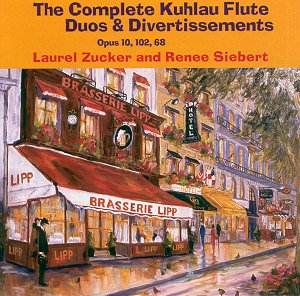Kuhlau, quite famous
in his time, is not a name often on
one’s lips today. Born in Uelzen in
north Germany to a musical family, he
lost an eye when he slipped on ice at
the age of seven. During his convalescence
a piano was moved nearby. He took to
the instrument. Though many would see
the fall as a tragic event, he considered
the accident a fortunate occurrence,
crediting it as the reason he became
a musician.
He received very little
formal training or education. When Hamburg
was annexed to the French in 1810, he
fled to Denmark, where his connections
afforded him an introduction to the
Queen’s court. He wrote variations for
piano, songs and chamber music. His
attempts at fame with larger-scale works
such as operas and oratorios, were met
with a wide-ranging degree of success:
Røverbergen (Robber’s
Castle) and Lulu with accolades;
The Magic Harp and Elisa
were disastrous financial failures.
He got on rather well with Beethoven,
who composed a canon, playing on Kuhlau’s
name in the title "Kühl, nicht
lau" (Cool, not lukewarm) during
a beverage-enhanced evening.
Based on what I could
gather in my research - no information
on the pieces is provided in the booklet
- the Op. 10 flute duos were almost
certainly composed in Denmark, during
the early part of his stay there. Op.
102 looks to have been composed in either
1828 or 1829, after his return to Denmark
from time spent in Sweden. I wasn’t
able to dredge up enough information
to determine when the Op.68 Divertissements
were composed.
All of the works here
are very pleasant listening; almost
all are in the usual sonata form with
recapitulation of the opening theme
at the end. Considering the large time-frame
between these pieces - early, middle
and late career - the style and tone
are consistent throughout. One notable
transitional moment in the second movement
of the Duo No. 2 Op. 102 has a deliberate
repeated minor second interval, but
all too soon resolves into sunny consonance.
Not particularly adventuresome regarding
tonality or form, the pieces remain
enjoyable, though the uniformity of
sound and style tends to become a bit
monotonous over two hours of listening.
The pieces on this
double CD set are all recorded with
just enough distance to give a good
sense of acoustics, but close enough
for good presence when played through
a variety of sound systems, from the
computer to car stereo to a high-end
rig. The tone during the forte
high-register passages is never shrill,
and Zucker and Siebert work very well
together, with no balance issues.
I will have to agree
with other reviewers regarding this
and previous releases on Cantilena:
works such as these deserve background
information and commentary. Though the
label itself focuses on the performances
of Laurel Zucker, the notes for the
individual releases should concentrate
on the pieces played. Overall, though,
this set represents a pleasant performance
of pleasant, rarely-heard works.
David Blomenberg


